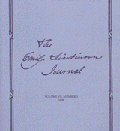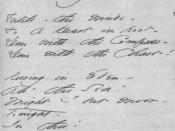! Dickinson's Poetry !!
Emily Dickinson was a poet, but because the nature and the purpose of her poetry often
was to edify her readers, Emily Dickinson was also a teacher. She did not teach math or science.
She did not teach geography or history. Through her poetry, she taught - and still teaches -
something of a far greater value: life lessons. In four of her poems, Dickinson uses the common
theme of perspective as a means to illustrate various lessons that each individual poem sets out to
teach. In her poem "Because I could not stop for Death" (pg. 1094), the theme of perspective is
developed through the point of view of a dead woman. In her Poem "Much Madness is divinest
Sense" (pg. 1089), Dickinson offers the perspective of somebody who is considered "mad". In
her poem "Success is Counted Sweetest" (pg. 1080), the theme of perspective is evident in the
comparison between those who win and those who lose. And in her poem "Tell all the Truth but
tell it slant" (pg. 1097), the theme of perspective is developed through the action it's title suggest
we take. In all four, Dickinson does an exceptional job.
"Because I could not stop for Death" is a poem about the experience of dying. Dickinson
writes the poem from the perspective of a woman who is ushered into the afterlife by a physical
incarnation of death. In the first stanza Dickinson writes, "Because I could not stop for death- He
kindly stopped for me-" and she goes on to write, in the last stanza, "Since then -'tis centuries -
and yet feels shorter than the Day I first surmised the horses' heads Were Toward Eternity-".
These quotes illustrate, simply, that the source of the...


